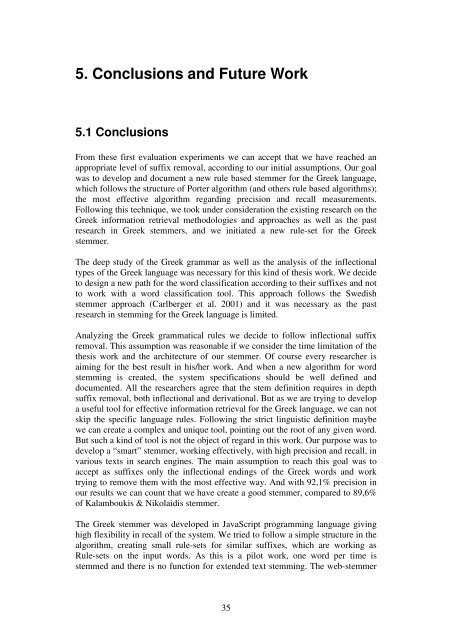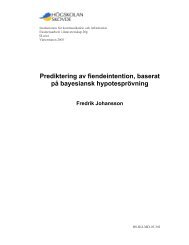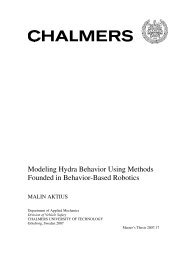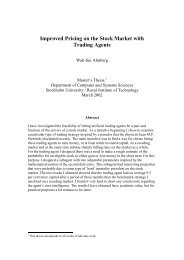Development of a Stemmer for the Greek Language - SAIS
Development of a Stemmer for the Greek Language - SAIS
Development of a Stemmer for the Greek Language - SAIS
You also want an ePaper? Increase the reach of your titles
YUMPU automatically turns print PDFs into web optimized ePapers that Google loves.
5. Conclusions and Future Work<br />
5.1 Conclusions<br />
From <strong>the</strong>se first evaluation experiments we can accept that we have reached an<br />
appropriate level <strong>of</strong> suffix removal, according to our initial assumptions. Our goal<br />
was to develop and document a new rule based stemmer <strong>for</strong> <strong>the</strong> <strong>Greek</strong> language,<br />
which follows <strong>the</strong> structure <strong>of</strong> Porter algorithm (and o<strong>the</strong>rs rule based algorithms);<br />
<strong>the</strong> most effective algorithm regarding precision and recall measurements.<br />
Following this technique, we took under consideration <strong>the</strong> existing research on <strong>the</strong><br />
<strong>Greek</strong> in<strong>for</strong>mation retrieval methodologies and approaches as well as <strong>the</strong> past<br />
research in <strong>Greek</strong> stemmers, and we initiated a new rule-set <strong>for</strong> <strong>the</strong> <strong>Greek</strong><br />
stemmer.<br />
The deep study <strong>of</strong> <strong>the</strong> <strong>Greek</strong> grammar as well as <strong>the</strong> analysis <strong>of</strong> <strong>the</strong> inflectional<br />
types <strong>of</strong> <strong>the</strong> <strong>Greek</strong> language was necessary <strong>for</strong> this kind <strong>of</strong> <strong>the</strong>sis work. We decide<br />
to design a new path <strong>for</strong> <strong>the</strong> word classification according to <strong>the</strong>ir suffixes and not<br />
to work with a word classification tool. This approach follows <strong>the</strong> Swedish<br />
stemmer approach (Carlberger et al. 2001) and it was necessary as <strong>the</strong> past<br />
research in stemming <strong>for</strong> <strong>the</strong> <strong>Greek</strong> language is limited.<br />
Analyzing <strong>the</strong> <strong>Greek</strong> grammatical rules we decide to follow inflectional suffix<br />
removal. This assumption was reasonable if we consider <strong>the</strong> time limitation <strong>of</strong> <strong>the</strong><br />
<strong>the</strong>sis work and <strong>the</strong> architecture <strong>of</strong> our stemmer. Of course every researcher is<br />
aiming <strong>for</strong> <strong>the</strong> best result in his/her work. And when a new algorithm <strong>for</strong> word<br />
stemming is created, <strong>the</strong> system specifications should be well defined and<br />
documented. All <strong>the</strong> researchers agree that <strong>the</strong> stem definition requires in depth<br />
suffix removal, both inflectional and derivational. But as we are trying to develop<br />
a useful tool <strong>for</strong> effective in<strong>for</strong>mation retrieval <strong>for</strong> <strong>the</strong> <strong>Greek</strong> language, we can not<br />
skip <strong>the</strong> specific language rules. Following <strong>the</strong> strict linguistic definition maybe<br />
we can create a complex and unique tool, pointing out <strong>the</strong> root <strong>of</strong> any given word.<br />
But such a kind <strong>of</strong> tool is not <strong>the</strong> object <strong>of</strong> regard in this work. Our purpose was to<br />
develop a “smart” stemmer, working effectively, with high precision and recall, in<br />
various texts in search engines. The main assumption to reach this goal was to<br />
accept as suffixes only <strong>the</strong> inflectional endings <strong>of</strong> <strong>the</strong> <strong>Greek</strong> words and work<br />
trying to remove <strong>the</strong>m with <strong>the</strong> most effective way. And with 92,1% precision in<br />
our results we can count that we have create a good stemmer, compared to 89,6%<br />
<strong>of</strong> Kalamboukis & Nikolaidis stemmer.<br />
The <strong>Greek</strong> stemmer was developed in JavaScript programming language giving<br />
high flexibility in recall <strong>of</strong> <strong>the</strong> system. We tried to follow a simple structure in <strong>the</strong><br />
algorithm, creating small rule-sets <strong>for</strong> similar suffixes, which are working as<br />
Rule-sets on <strong>the</strong> input words. As this is a pilot work, one word per time is<br />
stemmed and <strong>the</strong>re is no function <strong>for</strong> extended text stemming. The web-stemmer<br />
35





